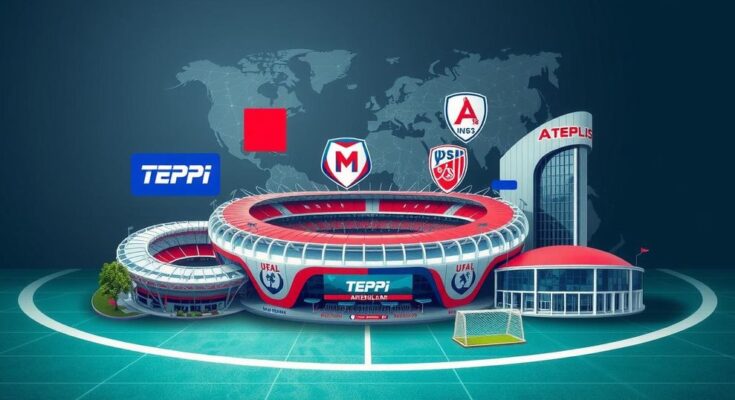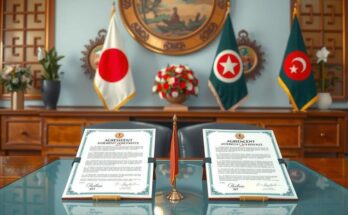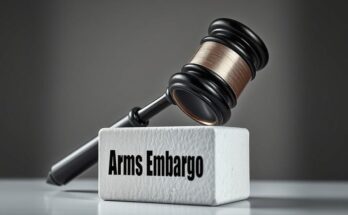The Democratic Republic of Congo has called on Arsenal, PSG, and Bayern Munich to end their sponsorships with Visit Rwanda amid a worsening humanitarian crisis and allegations of Rwandan military involvement in the DRC conflict. The DRC government highlights moral concerns over funds potentially linked to illicit mining activities, while critics accuse Rwanda of ‘sportswashing.’ The ongoing violence in the region exacerbates the urgency of this appeal as international scrutiny grows.
The Democratic Republic of Congo (DRC) has urged major football clubs Arsenal, Bayern Munich, and Paris Saint-Germain to retract their sponsorship agreements with Visit Rwanda due to ongoing humanitarian crises in the region. The request follows recent unrest, notably the M23 rebels’ takeover of Goma, which has displaced over 400,000 individuals this year as reported by the United Nations’ refugee agency. The DRC’s Foreign Minister, Thérèse Kayikwamba Wagner, emphasized that funds may derive from illicit activities tied to mineral exploitation in the DRC, raising moral questions around these partnerships.
Minister Kayikwamba Wagner sent letters to the owners of the mentioned clubs, directly addressing the morality of the sponsorships. In her correspondence, she cited evidence of Rwandan military involvement in the DRC conflict, asserting that Rwanda’s culpability is now undeniable. She urged Arsenal to end its sponsorship with Rwanda for ethical reasons, appealing to the clubs’ conscience regarding the victims of Rwandan aggression.
The Visit Rwanda campaign has been viewed as a major component of the Rwandan government’s strategy to improve its international image, historically faced with accusations of human rights violations. The sponsorship with Arsenal, commenced in 2018, is reportedly valued at over £10 million annually, with subsequent agreements with PSG and Bayern Munich amplifying concerns of ‘sportswashing.’
In eastern DRC, violence has continued unabated, with reports indicating that at least 700 lives have been lost in fighting in Goma. UN reports underscore the plight of civilians amidst the conflict, highlighting the necessity for intervention. Despite Rwanda’s claims of defensive military presence, the DRC accuses Rwanda of backing M23 rebels in pursuit of control over the region’s mineral resources.
The broader context of this appeal points to the urgent and precarious situation in the DRC, exacerbating a long-standing conflict rooted in ethnic tensions and resource control. For advocates of human rights, the collaborations of clubs like Arsenal, PSG, and Bayern Munich with Visit Rwanda epitomize a troubling normalization of complicity in oppressive regimes. The recent statements from Human Rights Watch emphasize the deterioration of political freedoms in Rwanda, drawing attention to the responsibility of international partners.
Rwanda’s tourism chief has dismissed allegations of attempting to ‘sportswash’ the country’s image, stating these claims are diversions from the nation’s accomplishments. As the conflict escalates, the DRC’s plea may serve to not only compel a reassessment of sponsorship deals but also raise awareness about the humanitarian crises connected to foreign partnerships.
In conclusion, the DRC’s request for football clubs to reevaluate their sponsorship arrangements with Visit Rwanda highlights significant moral considerations, particularly in light of the ongoing humanitarian calamity and political unrest. As international organizations document these circumstances, football clubs face increasing scrutiny regarding their roles and responsibilities in light of such affiliations.
The situation in the Democratic Republic of Congo has dramatically worsened, with recent escalations linked to the M23 rebel group’s activities and the Rwandan military’s alleged involvement. The humanitarian crisis has prompted the DRC government to question international partnerships that may inadvertently support the aggressor, Rwanda. Prominent football clubs have come under fire for their sponsorship ties with Visit Rwanda, as these deals are perceived to obscure the country’s human rights violations and the realities of conflict in the region.
The appeal by the DRC to terminate the Visit Rwanda sponsorships encapsulates serious ethical concerns related to sporting affiliations with regimes accused of oppression. As unrest continues to unfold in Goma, the call to action serves not only as a plea for humanitarian support but also as a demand for accountability from international partners in the context of global sporting events and sponsorships.
Original Source: www.bbc.com




